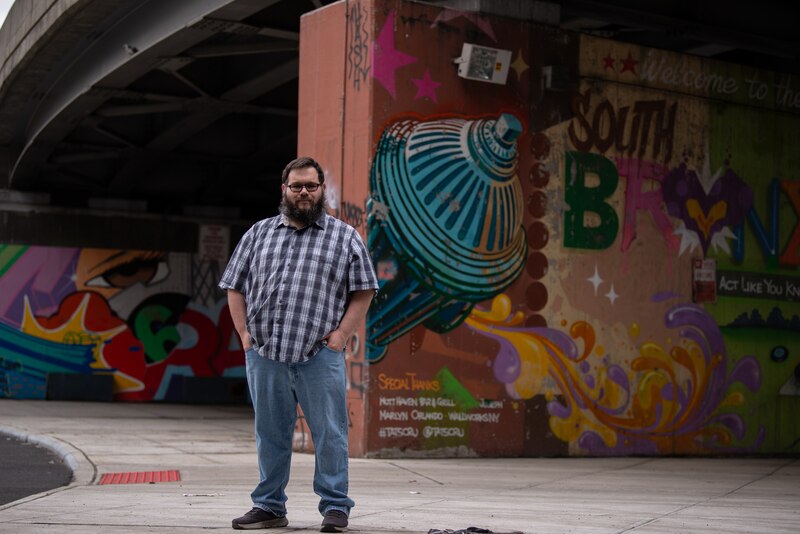This story was published in partnership with New York Focus, a non-profit news site investigating how power works in New York state. Sign up for their newsletter here.
This is the second installment in a two-part series reported with support from the Economic Hardship Reporting Project. You can read the first part here.
When the Queens public school where she was working assigned Antonietta Auriemma to seven classroom sections, she realized something was wrong.
Between January and June 2023, Auriemma, a substitute teacher, filled in for two different teachers on long-term leaves of absence, on top of extra classroom periods as needed.
According to her handbook, she should have been classified as a “long-term sub” — and qualified for the requisite pay and benefits.
In the nation’s largest public school system, most substitute teachers work day-to-day, filling in for short-term absences at a fixed daily rate of roughly $200. But amid a teacher shortage made worse since the pandemic spurred educators to flee in droves, more and more New York City schools have come to rely on substitutes on longer-term assignments. Because they are more like regular teachers, these long-term subs are supposed to earn around $100 extra per day, which can add up to roughly $25,000 more per year, according to the teachers union. Some accrue sick time, vacation time, and even get health insurance.
Auriemma wasn’t receiving any of that.
“I was basically a full-time teacher,” Auriemma told New York Focus. “I was lesson planning for these classes, entering grades for these students, speaking to parents for parent engagement, all while making the [lower] sub pay of $200 a day.”
For years, subs like Auriemma have been underpaid for their long-term services — a violation of the New York City Department of Education’s teacher contract with the United Federation of Teachers, or UFT.
Interviews with 10 former and current substitute teachers or substitute paraprofessionals suggest that the practice is systematic and widespread across the city, and that since the pandemic began, violations may have increased. In a Sept. 11, 2023, UFT executive board meeting, Mark Collins, the union’s grievance director, stated that schools paying substitutes at an incorrect rate is “probably the most common grievance we have in the city.” A UFT spokesperson confirmed that it is one of the top grievances in the union.
Nearly all the interviewed substitutes, whose labor spans multiple city boroughs, said they knew of schools that underpaid subs because of misclassification. Five of them said they had filed grievances related to these issues; three have won back pay as a result, while the others’ grievances are still pending resolution.
Those who don’t grieve their wage shortages may choose not to because they’re unaware of the contract provisions. Others, because of their relative precarity: Many subs depend on the work as their primary income and cannot miss days for fear of falling behind on bills. Six subs described a culture of retaliation that might get them fired or suddenly removed from the classroom if they complain.
“Once you file, you’re essentially blacklisted at a school.”
— JOE DIODATO, SUB WHO FILED A LABOR GRIEVANCE
Even if subs get to stay in the same school, they might get moved from classroom to classroom to preserve their place in the arcane classification system that keeps pay down. And when teachers get shuffled, students suffer.
Beth Ellor, who retired from full-time teaching in 2009, has subbed regularly since. She said she covered a class whose students blamed themselves for their lack of a regular teacher.
“They said, ‘Everybody hates us. Nobody wants to stay with us. We are a terrible class,’” Ellor recounted. Later, she found out that another substitute teacher had previously worked 27 days with that class before being moved to another assignment.
Ellor believes it was done to prevent that substitute from achieving the higher-paying status.
Asked about the problem, Education Department spokesperson Jenna Lyle acknowledged the “critical support” that subs provided during the pandemic.
“Thanks to temporary stimulus funding, we were able to provide additional financial support to schools to take on the additional costs of hiring more substitutes and have worked with the UFT and individual employees to address any outstanding pay issues from this period,” Lyle wrote in an email.
She declined to comment on the widespread, sometimes intentional practice of misclassifying subs, which existed before the outbreak of COVID.
In the education system, it’s not uncommon for subs to fall through the cracks, said David Bloomfield, an education law professor at Brooklyn College and the City University of New York Graduate Center. “Those cracks widened during the pandemic,” he said. “This seems like a situation that hasn’t been given adequate attention by either the union or the central administration.”
Pay scale for subs varies by assignment length
The teachers union contract establishes various letter-coded “statuses” of service to which a substitute teacher can be assigned.
The most common sub classification, “O-status,” is for day-to-day subs who cover short-term absences. Subs are assigned “Z-status” or “Q-status” when working full-time for schools, filling in for longer-term teacher absences or vacancies. Those subs receive higher pay and limited benefits that are unavailable to O-status subs. The Education Department’s payroll system automatically grants the higher-paying Z-status to substitutes so long as they teach a class without an absence for 30 days.
When subs are told to miss a day, it resets the clock.
“What happens is a lot of principals know that [subs] get paid more money” under higher tiers of sub service, said a former school payroll secretary, who asked to remain anonymous because she still works in the school system and fears retaliation. “They don’t want to pay them the higher status, so they’ll tell a sub, don’t come in on this day, for whatever reason, and that defers them back to the old status so they can’t get paid more money.”
“You want to use money to hire more teachers, more supplies, or to get air conditioners. Nobody even thinks of subs.”
— JOHN WENK, FORMER PRINCIPAL IN MANHATTAN
The substitutes who spoke to New York Focus described a widespread practice of either denying qualified substitutes Q- or Z-status, actively preventing subs from qualifying, or displaying incompetence in staffing subs under the appropriate status.
“It’s a known thing that principals have tight budgets … and [forcing a missed day] is one way they cut corners in saving money,” said the former payroll secretary. “It doesn’t even get discussed.”
When Joe Diodato subbed for a semester at an elementary school in the Bronx, it found a way to underpay him — without forcing a missed day.
Instead, according to documents Diodato shared with New York Focus, the school periodically changed the code in the payroll system associated with his work assignment. The action incorrectly made it seem like he wasn’t teaching the same class over the course of his employment, a condition required to earn Z-status.
Diodato didn’t learn about the higher-paying sub statuses until a couple months into the job. When he asked his payroll secretary about them, they said he didn’t qualify.
“Every day I came in I documented what I did,” Diodato explained. “I saved my classroom Zoom meetings, I saved my Google Classroom posts, my parent engagement. Everything that showed I did the job of a classroom teacher, I saved.”
At the end of the year, he used his records to file a 187-page grievance. He eventually won nearly $6,000 in a settlement with the Education Department.

Diodato intentionally waited for the school year to run out before filing his grievance. “Once you file,” he said, “you’re essentially blacklisted at a school.”
Now a full-time teacher, Diodato runs a private Facebook group for substitutes and a blog about the city Department of Education. He believes that more substitutes have likely been filing grievances on long-term status issues since the pandemic began, when the DOE increased its reliance on subs. But most violations, several subs explained, likely go unchallenged.
Without the higher pay and benefits, subs often quit mid-assignment, Diodato said.
Several subs who spoke to New York Focus requested anonymity because they were pursuing full-time teaching positions at their schools. They described a common belief that contesting their status would endanger their chances of full-time employment — or get them fired from their temporary positions.
One substitute, who requested anonymity, subbed regularly at a high school for seven years until she tried to claim increased benefits and wages.
When the sub challenged a principal’s reasoning as to why she could not earn Z-status, “she fired me on the spot,” the sub said. “She said, ‘You are on my last nerve … Yeah, I lied to you. I know what the rules are … but I’m the principal and I make the decisions, and you’re just a sub.’”
John Wenk, a former principal of a Manhattan high school, said that retaliation against subs is unsurprising behavior for some principals and can be done with impunity.
A principal, he explained, is free “to get rid of the sub for any reason whatsoever.”
“I’ve seen that happen,” said the former payroll secretary. But in most cases, she said, subs don’t bring the issues up in the first place. “They need a job. They need money,” she said, “so they’re not going to rock the boat.”
A UFT spokesperson acknowledged that most subs grieve pay violations after their assignment has finished, presumably out of fear of retaliation. They emphasized, however, that subs are already covered by contractual and legal anti-retaliation rules, and that the union is trying to add further protections so they are comfortable filing grievances as soon as the violation occurs.
Pointing fingers at Education Department red tape
Although it falls on individual school payroll secretaries, principals, and administrators to carry out pay violations, some argue that the DOE’s bureaucracy is to blame.
The money to pay substitutes comes from the DOE central administration, but once schools receive it, principals can use the money however they please. Operating under strained resources, with dozens of budgetary items to attend to, a principal may be incentivized to use the money intended for subs on resources deemed more necessary.
“You want to use that money to hire more teachers, or for more extracurricular activities, more supplies, or to get air conditioners,” Wenk said. “Nobody is thinking about this problem. Nobody even thinks of subs.”

Bloomfield believes principals and individual schools are not equipped to deal with the problem in the first place.
“Principals have neither the expertise nor the budgetary acumen to make the substitute puzzle pieces fit together with all the other pressures they’re under,” he said. “It’s therefore incumbent on the central administration, both the DOE and the city, to offer clear guidance consistent with union contracts and other legal provisions to assist in filling these positions.”
A UFT spokesperson said the union has been working to shift the burden of ensuring correct pay from the subs to the Education Department. The spokesperson referenced an agreement the union won in recent contract negotiations to establish guidance to re-train and educate administrative staff on substitute hiring — to ensure correct classification, pay, and health coverage.
But some subs told New York Focus that they attribute the ubiquity of pay violations in part to the UFT’s inadequate representation of substitutes.
“While [UFT reps] seem to be helpful and they want to be that point of contact for when situations need to be escalated, a lot of them are just at a loss,” said a former substitute teacher in Bushwick, Brooklyn, who requested anonymity.
“We disagree that UFT reps are ‘at a loss,’” a teachers union spokesperson wrote in a statement. They noted that any substitute can receive immediate representation for a grievance.
Bloomfield sees the problem as baked into the DOE’s treatment of its workforce.
“Just that very term ‘substitute’ reeks of second-class citizenship in the personnel constellation,” he said. “They’re an afterthought.”
Teddy Ostrow is a journalist from Brooklyn. He was the host of The Upsurge podcast and his work has appeared in The Nation, The New Republic, In These Times, and elsewhere.

